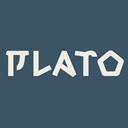Plato Research Dialogue System Alternatives

Plato Research Dialogue System
The Plato Research Dialogue System enables experts and non-experts alike to quickly build, train, and deploy conversational AI agents.
The Plato Research Dialogue System is a flexible framework that can be used to create, train, and evaluate conversational AI agents in various environments. It supports interactions through speech, text, or dialogue acts and each conversational agent can interact with data, human users, or other conversational agents (in a multi-agent setting). Every component of every agent can be trained independently online or offline and Plato provides an easy way of wrapping around virtually any existing model, as long as Plato's interface is adhered to.
How does the Plato Research Dialogue System work?
Conceptually, a conversational agent needs to go through various steps in order to process information it receives as input (e.g., “What’s the weather like today?”) and produce an appropriate output (“Windy but not too cold.”). The primary steps, which correspond to the main components of a standard architecture, are:
Speech recognition (transcribe speech to text)
Language understanding (extract meaning from that text)
State tracking (aggregate information about what has been said and done so far)
API call (search a database, query an API, etc.)
Dialogue policy (generate abstract meaning of agent’s response)
Language generation (convert abstract meaning into text)
Speech synthesis (convert text into speech)
Plato has been designed to be as modular and flexible as possible; it supports traditional as well as custom conversational AI architectures, and importantly, enables multi-party interactions where multiple agents, potentially with different roles, can interact with each other, train concurrently, and solve distributed problems.
Best Plato Research Dialogue System Alternatives for Self Hosted
Want another awesome Plato Research Dialogue System alternative? Look no further. We researched the top alternatives and found several new Plato Research Dialogue System alternatives that work with your platform or device. If you want even more options, we've also reviewed top Plato Research Dialogue System-like software for your Mac, Windows PC, Android phone/tablet, Linux computer, or iPhone.

ConvLab
FreeOpen SourceSelf-HostedConvLab is an open-source multi-domain end-to-end dialog system platform, aiming to enable researchers to quickly set up experiments with reusable components and compare...

DeepPavlov
FreeOpen SourceSelf-HostedDeepPavlov is an open-source conversational AI library built on TensorFlow and Keras. It is designed for: • development of production ready chat-bots and complex...
Features:
- Artificial intelligence
- Chat Bot

Olympus
FreeOpen SourceSelf-HostedOlympus was created at Carnegie Mellon University (CMU) during the late 2000's and benefits from ongoing improvements in functionality. Its main purpose is to help...

ParlAI
FreeOpen SourceSelf-HostedA python framework for sharing, training and testing dialogue models, from open-domain chitchat to VQA.

PyDial
FreeOpen SourceSelf-HostedPyDial is an open-source end-to-end statistical spoken dialogue system toolkit which provides implementations of statistical approaches for all dialogue system modules....

Rasa Core
FreeOpen SourceWebSelf-HostedRasa Core: Throw Away Your State Machine and Use Machine Learning For Dialogue Management Manage your dialogue with machine learning and let it improve with every...
Features:
- Bots
- Machine Learning

Virtual Human Toolkit
FreeSelf-HostedA collection of modules, tools, and libraries designed to aid and support researchers and developers with the creation of virtual human conversational characters.
Upvote Comparison
Interest Trends
Plato Research Dialogue System Reviews
Add your reviews & share your experience when using Plato Research Dialogue System to the world. Your opinion will be useful to others who are looking for the best Plato Research Dialogue System alternatives.